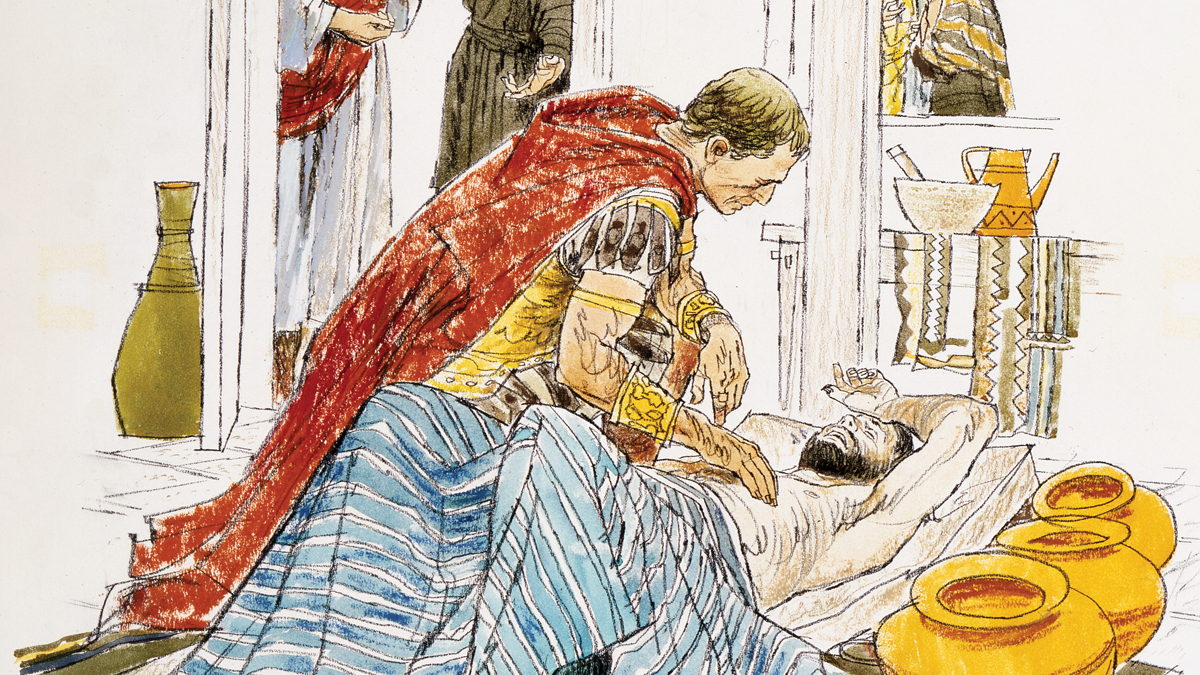The text for this lesson is Matthew 8:5–13
Key Point
- The centurion prayed for his servant to be healed. God invites us to pray for our needs and the needs of others.
- Law: The result of sin is sickness, suffering, and death (Genesis 3:15–19), which can sometimes manifest itself in birth defects, hereditary diseases, communicable illnesses, paralysis, mental illness, and physical injuries.
- Gospel: Jesus died for sin once for all, redeeming both soul and body. He invites me to pray for both spiritual and bodily blessings for myself and others in need, and on the Last Day, He will raise me and all who believe in Him to life eternal with glorified, perfect bodies.
Context
- Jesus had begun His earthly ministry of preaching, teaching, and working miracles. His preaching revolves around repentance and forgiveness (Matthew 4:17). He had already called His disciples and preached the Sermon on the Mount. “The crowds were astonished at His teaching, for He was teaching them as one who had authority” (Matthew 7:28–29). When He came down from the mountain, He healed a leper and then entered into Capernaum, a city on the Sea of Galilee, His home district.
Commentary
A centurion is a Roman military officer in command of one hundred soldiers. The Romans were an occupying army. They were not Jewish. For the most part, they did not sympathize with the Jewish religion. This officer approaches Jesus, interceding on behalf of his paralyzed servant. His care and concern for his servant is admirable.
Jesus agrees to come to the centurion’s house in order to heal the servant. But the officer objects, citing his own unworthiness for Jesus to enter into his house. He knows that like the leper, he is an outcast in Jewish society. He understands that Jewish customs are different from Roman customs and that he is considered unclean. He also understands that Jesus is a holy man and that he himself is a sinner. Therefore, he says, “Lord, I am not worthy to have You come under my roof.” This is a profound and unusual confession from a high-ranking Roman officer.
His next confession is more impressive. “Only say the word, and my servant will be healed” (8:8). Here, he shows that he also understands that Jesus has the authority to command supernatural forces. The centurion believes that Jesus has divine power to heal without being present. He comprehends that his military authority is a small picture of God’s eternal authority here on earth.
Marveling at the man’s faith, Jesus takes the opportunity to reprimand the Jews for their lack of repentance and faith. A foreigner comes to Jesus in faith seeking divine mercy, but His own people refuse to believe.
The Gospel of Jesus is not for the Jews only; it is for all people, regardless of nationality or race, who have faith that Jesus is Lord. This faith is demonstrated by willingness to confess unworthiness for God’s grace, trust in God’s power, and confidence to approach God in prayer.
Jesus grants the centurion’s petition, and his servant is healed that very moment.
Prayer is intercession for yourself and others. Matthew, Mark, Luke, and John record for us how Jesus often prayed. The content of those prayers shows that He prayed not only for what was about to happen to Him, but also for His disciples and those who would listen to them (John 17:20–21).
A noteworthy part of Paul’s letters is his admission that he prays for the people to whom he is writing and asks them to pray for him as well. He tells Timothy to make petitions for all people, for kings and all those in authority. Those who believe in Jesus can pray to God not only for themselves but also for others, even unbelievers, and expect God to hear them for Jesus’ sake..







